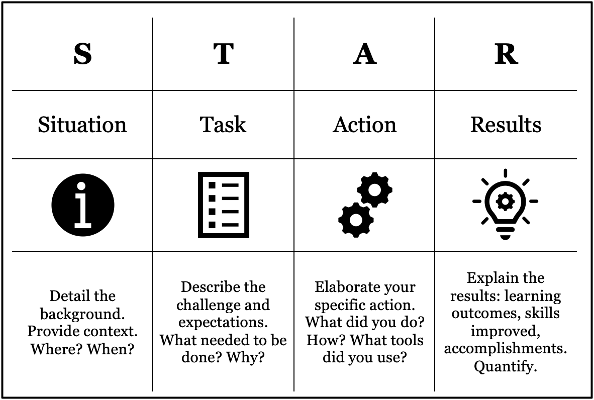Types of Interviews
Check with the school to learn how the interview will be structured.
- Closed File/Blind – The interviewer(s) does not have access to your application before/during the interview.
- Semi-Blinded – The interviewer(s) has access to limited information from your application (for example, only your essay/letters/experiences or only your grades/test scores)
- Open File – The interviewer(s) has access to your entire application, and will likely review it before the interview. Some of the interview questions might refer directly to information from your application.
- Traditional – One or two interviewers will interview you for a set amount of time (30 mins, 45 mins, 60 mins).
- Group – You will be interviewed by one-four interviewers alongside one-three other candidates. There might be some individual questions asked of you, and there might be a group discussion question/problem that all candidates will solve/answer together.
- Multiple Mini Interview (MMI) – A series of timed interview stations/scenarios (each one-on-one with an interviewer). Typically you will move through six-ten interview stations with each interview lasting six-eight minutes.
- Hybrid – Some combination of the above interview types.
Practice Resources
Mock Interviews
- Ask friends and family to conduct mock interviews
- Sign up for a mock interview with Career Services through Handshake or with Pre-Health Advising through Navigate
- Attend a Career Services Interview Practice Workshop
- Practice using Interview Stream
- Using your phone or computer, film yourself and critique your body language, eye contact, and word choices (especially filler words).
Resources
- General Interview Tips
- Preparing for Medical School Interviews
- Preparing for Dental School Interviews and Dental Interview Tips
- Preparing for PA School Interviews
- Recommended Books:
- Specifically for MMI prep:
Virtual Interviews
Utilize the STAR Method

When answering questions, you should:
- Always answer the question being asked first.
- Use an example/past experience to flush out your answer and demonstrate core competencies.
- Be detailed in describing your experiences by using the STAR method.
Commonly Asked Questions
These are questions you should prepare and rehearse before your interview.
Tell me about yourself.
Here’s a full-proof way to approach this question. This question should be answered in 1-1.5 minutes.
- A fun/interesting fact about you. This can help break the ice, make you and the interviewer feel at ease, and make you come across as human/relatable.
- Who you are, where you’re from: your name, background, education, what you’re doing in life right now – any relevant details that help explain your path to health profession school/your future career.
Why this school?
What (specifically) about the school interests you?
- Should be tangible things about the school such as curriculum, student experiences, faculty/research, program opportunities, career outcomes.
- Things like geographical location, weather, distance from your home, cost of attendance shouldn’t be the most important aspects of why you’re interested in this school.
- Most importantly, how does the school’s mission/offerings fit into the experiences you’ve had and your goals for health profession school/your career. Connect your experiences to what the school offers and talk about why that school will help you reach future goals.
- Review the school website, watch videos, webinars, and seek out current student feedback.
Why this profession?
This should compliment your personal statement by outlining the activities/experiences that have shaped you and demonstrate your fit for the profession.
FAQs
How much should I prepare?
Research conducted on the medical school admissions process shows that interview results become the most important factor considered post-interview in whether to admit a candidate or not.
It’s important to sufficiently prepare for interviews, although the level of preparation is different for each candidate; some people are more comfortable in an interview setting than others. If you are not a natural and get nervous in an interview setting, doing mock interviews, going over practice questions, and reviewing your application and experiences for at least one hour/day for one-two weeks before the interview is a good idea.
How long should my responses be?
Your responses shouldn’t be too short that the question isn’t sufficiently answered (leaving the interviewer wanting to know more) and not too long that the response loses focus or goes into unnecessary detail. Most questions can be answered in under 3 minutes, but longer questions might require longer responses. It’s important to read the body language of the interviewer, as they usually give visual cues as to when to keep talking and when to wrap up your response.
Should I repeat info from my application?
Yes. It’s important to tie your answers back to the experiences you talked about in your application as those are the key reasons why you chose to apply. It’s good to expand upon experiences in your application and also have different examples and other experiences not talked about in your application that you can refer to, if needed. Depending on the type of interview (blind vs. open), the interviewer might or might not be aware of your experiences in your application.
What if I don’t know how to answer the question or don’t have relevant experience?
It’s important to answer all questions. If you don’t know how to respond at first, it’s acceptable to ask for a moment or two to gather your thoughts. If you’ve never been in a similar scenario to the question asked, you can state that, and follow-up by outlining how you would respond hypothetically.
What if I don’t connect with the interviewer?
That’s normal and don’t take it personally. Not all interviewers will be friendly, outgoing, or welcoming. Some schools train interviewers to be cold, distant, or to not respond with positive feedback so that the interview is less biased.
Focus on answering their questions and be professional, polite, and genuine. At the end of the interview always extend your thanks for their time.
Should I send a thank you note?
Yes, a follow-up thank you email is recommended and professionally appropriate.
